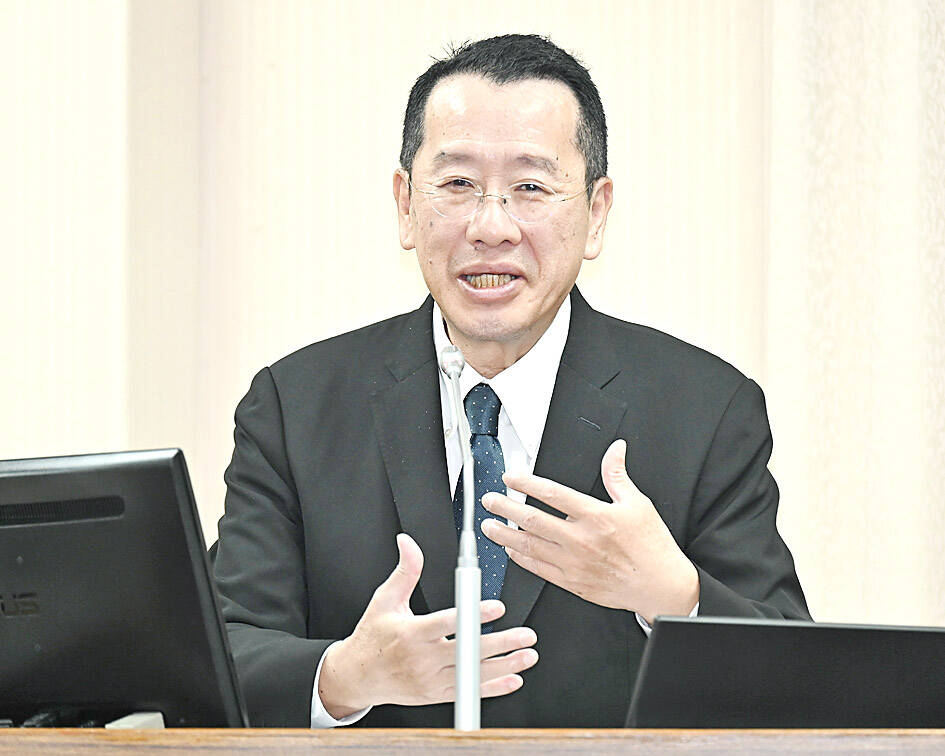A Chinese blockade of Taiwan would be an act of war and have far-reaching consequences for international trade, Minister of National Defense Wellington Koo (顧立雄) said yesterday, after drills by China last week practiced such a scenario.
Beijing has over the past five years staged almost daily military activities around Taiwan, including war games that have practiced blockades and attacks on ports.
China’s latest war games named “Joint Sword-2024B” were carried out on Monday last week, which Beijing said included simulating blockading ports and areas, and assaulting maritime and ground targets.

Minister of National Defense Wellington Koo speaks at the Legislative Yuan in Taipei yesterday.
Photo: Tu Chien-jung, Taipei Times
Speaking to reporters on the sidelines of a legislative hearing, Koo said that while “Joint Sword-2024B” delineated the exercise area, there were not any no-flight or no-sail zones.
The Legislative Yuan’s Foreign Affairs and National Defense Committee held a hearing on how the Chinese People’s Liberation Army (PLA) is attempting to gradually box Taiwan in with its “gray zone” and “anaconda” strategies, and how the nation would ensure the provision of materials for critical industries, infrastructure, power generation, food security, medical goods and daily necessities under such conditions.
Koo told lawmakers that blockades, as defined under international law, are acts of war in which a country’s air and sea traffic are completely embargoed by an enemy nation using military force.
“Under UN General Assembly Resolution 3314, blockades are categorized as an act of aggression,” Koo said. “I want to stress that drills and exercises are totally different from a blockade, as would be the impact on the international community.”
A blockade would have consequences beyond Taiwan, as one-fifth of global freight passes through the Taiwan Strait, he said.
“The international community could not sit by and just watch,” Koo said.
Democratic Progressive Party (DPP) Legislator Loh Mei-ling (羅美玲) said that last year Taiwan imported 96.7 percent of its energy resources, and the legally required stockpiles are 90 days for crude oil, 30 days for coal and eight days for liquefied natural gas (LNG).
Given that natural gas is expected to account for half of the nation’s energy production by 2025, Loh asked what Taiwan should do if it is blockaded by the PLA.
The current stockpile amount exceeds the legal minimum, although there is less LNG than other energy resources, State-owned Enterprise Commission Director Hu Wen-chung (胡文中) said.
The Ministry of Economic Affairs has plans to build three additional natural gas terminals and once those are completed, Taiwan could have up to 14 days of LNG stockpiled, he said.
In the event of a blockade, energy usage would be expected to decrease, and the actual store of LNG would exceed 14 days, he added.
The ministry can resort to converting decommissioned coal-fired power stations into emergency backup plants, given the larger stockpile of coal compared with LNG, Hu said.
Meanwhile, National Chung Shan Institute of Science and Technology president Lee Shih-chiang (李世強) said the Coast Guard Administration (CGA) has non-lethal munitions such as stun and paint munitions, and these could be used to deter the China Coast Guard (CCG) or its maritime militias.
CGA Deputy Director-General Hsieh Ching-Chin (謝慶欽) said when China held its exercises, the agency designated two ships to monitor each CCG ship participating in the drills, adding that the CGA was ready to intervene had the CCG ships attempted to board fishing or commercial ships in the exercise zone.
Separately, the Ministry of Digital Affairs launched the Project Testing Information Network Resilience using the Program for the Digital Resilience Validation of Emerging Technologies for Contingency or Wartime Applications in July, which was aimed at verifying the feasibility of non-geostationary satellite orbits as an emergency backup communication network and achieved total coverage over Taiwan.
However, Koo said that the bandwidth provided by the network resilience project was insufficient for the military’s purposes.
In addition, a report the National Science and Technology Council submitted to the legislature showed that the Hsinchu, Taichung and Tainan science parks have been designated as critical infrastructure.
In addition to operating dual backup strategies for electricity, power and gas, a critical new measure is setting up defense systems to combat drone attacks, it says.
The science parks have been designated as no-fly zones, and last year, security services purchased drone jammers, it says.
By the end of this year, the parks will have completed setting up a new drone detection system and countermeasures to combat drone swarm attacks, the report says.
Source: Taipei Times - 2024/10/24




















